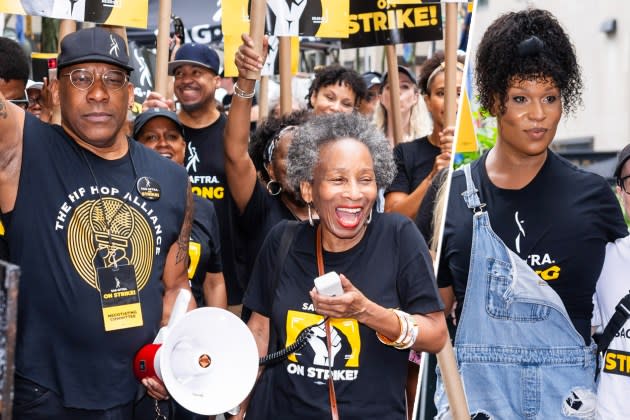Dispatches From The Picket Lines: Protest Songs & “People’s Spirits” Echo At Musical Rally In Manhattan
- Oops!Something went wrong.Please try again later.

This is Day 106 of the WGA strike and Day 33 of the SAG-AFTRA strike.
A backup singer featured in the Oscar-winning 2013 documentary 20 Feet from Stardom had center stage on Tuesday morning at a musical picket line outside NBCUniversal headquarters in Manhattan. On a crowded thoroughfare at Rockefeller Center, Janice Pendarvis led other vocalists and several dozen SAG-AFTRA picketers in call-and-response verses and choruses of the protest anthem, “Ain’t Gonna Let Nobody Turn Me ’Round.”
More from Deadline
It was the first of three solidarity marches uniting musicians and actors on SAG-AFTRA’s Tuesday pickets schedule, with events also happening in Nashville and Los Angeles. In New York, Pendarvis marched and harmonized with her 20 Feet co-star Lisa Fischer as well as singer and former RuPaul’s Drag Race contestant Peppermint. They were joined on the picket line by Juno and The Umbrella Academy star Elliot Page.
Elliot Page, Peppermint, and Janice Pendarvis were among those demonstrating today at the SAG-AFTRA musicians picket in NYC
📸 Sean Piccoli/Deadline pic.twitter.com/iIIftgnGQc— Deadline Hollywood (@DEADLINE) August 15, 2023
Pendarvis has worked with musicians including The Rolling Stones, David Bowie, Sting, Peter Tosh and Laurie Anderson. She’s also SAG-AFTRA’s national vice president for recording artists and singers. On Tuesday, she told Deadline that she wasn’t here just to sing.
“This isn’t frivolous entertainment,” Pendarvis said. “This is to sustain people’s spirits while they aren’t making money. This is to help people persevere.”
Likening the union to family, she said, “We need the spirit of perseverance in this family while we’re dealing with these insane employers who aren’t willing to give less than 1 percent … of their total revenue to end both strikes, WGA and SAG-AFTRA.”
Recorded versions and variations of the song range from early bluesman Blind Willie McTell to folk legend Joan Baez to the contemporary vocal group Sweet Honey in the Rock, whose take is featured in the 2000 telefilm Freedom Song starring Danny Glover. Marchers on Tuesday adapted verses to the occasion, with Pendarvis singing, “We gonna strike ’til we win/They can’t turn me around.”
Janice Pendarvis, star of the documentary, 20 Feet From Stardom, and SAG-AFTRA’s National VP for Recording Artists and Singers, leads demonstrators in song today at the SAG-AFTRA musicians picket in NYC pic.twitter.com/rxjWpUjQOW
— Deadline Hollywood (@DEADLINE) August 15, 2023
They also heard a rally-capping speech from a New York Assemblymember Zohran Mamdani. The rep from Queens, who previously worked as a counselor for low-income homeowners fighting eviction, said the actors and writers strike “is the struggle of every working person in the country.”
“There are some people who try and say, ‘Oh you work in film and TV: What do you really have to complain about?’” Mamdani said. “They are confusing visibility with dignity. You cannot pay your rent on exposure. Not on views and likes and retweets. You pay your rent with money. You need to be paid in money. Let the CEOs live off — let them have some exposure for a bit and you get their share.”
Pendarvis, who grew up in Queens, said the kind of activism embodied by the actors strike comes naturally to her. “Organizing is in my blood,” she said, recounting the time as a kid that she delivered a prepared speech — with her parents blessing — to a New York City regulatory panel that was deciding whether to turn a neighborhood zoned for housing around Idlewild Airport (now JFK) into commercial property for delivery companies.
“We lost that fight, but the neighbors won every fight after that,” she said.
Janice Pendarvis, one of the star’s of the documentary, 20 Feet From Stardom, and SAG-AFTRA’s National VP for Recording Artists and Singers, explains keeping spirits high during the strikes with events like today’s SAG-AFTRA musicians solidarity picket in NYC: “This is to help… pic.twitter.com/uG82ZB3m98
— Deadline Hollywood (@DEADLINE) August 15, 2023
Pendarvis said she wasn’t ready to read anything into the resumption of talks between her union counterparts at the Writers Guild of America and the Alliance of Motion Picture and Television Producers “until there’s a good deal signed.”
“When they get a great deal, I’m like, ‘OK,’ and at that point all I know is it’s our turn next,” she said. “Now how long are they going to decide to hang us out to dry? Because they are cruel. This is a cruel strike. It’s completely unnecessary.”
She also described the strike as a fight for respect, a living wage and the future terms of employment.
“It’s about a framework for not just the generations now but way off into the future,” Pendarvis said. “If we can’t get these employers to work with us on deciding a format, or the beginnings of a format, for how people get paid with emergent technologies, what happens to those people come 20, 30 years from now?”
Best of Deadline
2023 Premiere Dates For New & Returning Series On Broadcast, Cable & Streaming
SAG-AFTRA Interim Agreements: Full List Of Movies And TV Series
Sign up for Deadline's Newsletter. For the latest news, follow us on Facebook, Twitter, and Instagram.
